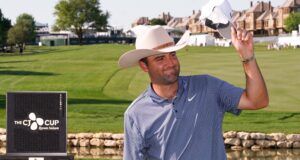In a sport built on integrity, Davis Riley just gave us a textbook example of it — even if it cost him strokes during a PGA event.
During Saturday’s continuation of the weather-delayed second round at the CJ Cup Byron Nelson in McKinney, Texas, Riley called a two-stroke penalty on himself for a seemingly small but significant miscue: using the slope function on his rangefinder.
Yep — the PGA Tour’s experimental six-week trial for allowing rangefinders in competition just got its first enforcement moment. And Riley? He stepped right up and owned it.
A Simple Mistake, a Serious Rule
Here’s how it went down: standing on the par-3 17th — his 8th hole of the day — Riley looked through his rangefinder to zap the pin. That part is legal under the trial period.
But then, he noticed something odd — a second number on the screen. That meant the slope feature was on, which is a violation. Rangefinders can be used but must not display yardages adjusted for elevation changes.
He hit his tee shot to 12 feet, made par, and then immediately found rules official Ken Tackett to report himself.
“In that moment, I was just like, wow,” Riley said. “It was a tough deal, and it’s just a bad break.”
Tackett confirmed the violation: two strokes, changing Riley’s par into a bogey 5 on the card. Fortunately for Riley, intent mattered. He wasn’t disqualified because he caught it right away, reported it, and didn’t repeat the mistake.
“All I can boil it down to is bad luck,” he said. “By the time you put the thing in there and pull it out, it switched from just raw number to slope.”
It’s a subtle but huge distinction. If Riley had unknowingly repeated the error, he might have been DQ’d, ending his tournament.
Instead, he turned the page and finished the round like a pro — with a birdie at 8 and an eagle on 9, good for a 71 and just enough to make the cut at five under.
Self-Policing: The Heart of the Game
Riley’s decision struck a chord in a sport that still honors quiet rules, calls, and scorecard honesty.
“It’s a gentleman’s game,” Riley said. “That’s the integrity of the game… You kind of have to have that same trust.”
Let’s be real — only Riley and his caddie would’ve known the slope feature was engaged. It would’ve been easy to ignore, say nothing, and move on. But he didn’t. He faced it, reported it, took the penalty, and then birdied and eagled his way back into the tournament.
If that’s not a microcosm of everything golf should be, what is?
But Riley’s moment of honesty also sparked a broader question: is this new rangefinder trial ready for the big stage?
The PGA Tour’s test run is supposed to help speed up play, but it’s already created confusion. Riley said this kind of mix-up has happened before, and he’s not the only one talking.
“I was just talking to the rules officials… I’d hate to see something happen coming down the stretch, and you pull out a rangefinder, and it ends up a two-stroke penalty and costs the tournament.”
That’s a fair concern. Is the slope function toggling on accidentally? That’s not far-fetched — and in a high-stakes moment, one tap of a button could alter a player’s fate. For Riley, it was a penalty on a Friday cutline. For someone else, it might be a major on Sunday.
Riley Lost Two Strokes, Gained Respect
Davis Riley didn’t gain an advantage. He didn’t cheat. He just had a split-second lapse with a new tool, realized it, and chose to uphold the rules.
And in a sport where trust is everything, that matters a lot more than a clean scorecard.
Riley made the cut. He kept his composure. And he reminded everyone that golf’s greatest moments sometimes have nothing to do with birdies — and everything to do with honor.



